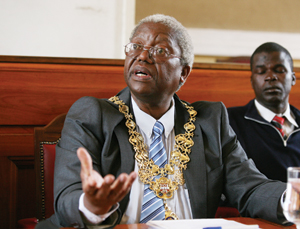By Davison Muchadenyika, Bochum, Germany
Modern thinking dictates that the question of urban service delivery is no longer a Zanu-PF or MDC issue, but rather the individual leadership assigned to lead urban councils.

That the contestation between Zanu-PF and the MDC has been sustained at the detriment of urban service provision is no longer disputable.
This political reality leaves a caveat to advance a new thesis that values the calibre of mayors more than political affiliation. Now that the dust has settled over the election of mayors in all towns and cities, it is time to revert to the fundamentals of urban administration.
Debate over the past months has concentrated on the constitutional provisions pertaining to the election of mayors. This is however not the intention of this article.
The debate was elusive as it missed the important issues that affect us as residents – the calibre of mayors and what they are supposed to do. Few doubt that the collapse of the state has resulted in the importance of urban administration. It is also very clear that major cities like Harare and Bulawayo have showed their discomfort with the ruling elites through their choices of who should govern urban areas.
For urban residents the office of the mayor is very important to urban life. Water, sanitation, health, education, housing, public transport are areas of jurisdiction to which mayors preside over. The potency and role of the mayor is expected to increase once we switch to executive mayorship in line with the new constitution.
In this article, I intend to focus on what the newly elected mayors should emulate from their predecessors especially former Harare Mayor Muchadeyi Masunda. Naturally as an urban planner, I have been taking stock of his achievements and leadership ethics while in office. However, in a political system largely determined by party rhetoric, those not from the main political parties like Mayor Masunda are left unacknowledged.
The greatest strength displayed by Mayor Masunda was to rise above political differences and work for the common good of Harare residents. He entered town house at the highest level of political polarization in Zimbabwe.
Harare had been under a Commission for quite some time, following the dismissal of Mudzuri. The local government ministry had displayed insatiable appetite in firing opposition mayors. With a very difficult and arrogant minister, Mayor Masunda pulled through and managed to deliver his duties.
My interaction with senior council heads of departments is testament that Mayor Masunda provided strong and focused leadership. He is credited for being impartial, workaholic and inclusive.
Through the mayor’s initiatives, critical city departments were capitalized with modern information systems which are key in providing accurate data for decision making. This was done after years of council failure to acquire modern urban planning information systems.
It is no secret that urban poverty is now a major development concern in Zimbabwe. Mayor Masunda identified himself with every class of the society. His role and engagement in the on-going ultra-low income housing project in Dzivarasekwa speaks for itself.
It takes humility and wisdom for a highly acclaimed legal practitioner to sit down and discuss issues with the poorest communities in urban areas. This is the hallmark of leadership; non-discriminatory and engaging with every citizen irrespective of socio-economic standing.
In 2009, it was clear that the government backed ZINWA had presided over a cholera epidemic that claimed 4000lives – the deadliest cholera outbreak in Africa over the previous 15 years. Government backtracked and handed back water and sanitation functions to local authorities.
For Harare, the scenes of 2008 are still very clear in our eyes and minds – critical water shortages and sewage flowing in streets. However, the Masunda led council managed to stabilise the situation, something unexpected in a short period of time.
One important lesson here – the necessity of focusing on key priorities of residents.
I met Mayor Masunda personally in Barcelona at a World Bank rethinking conference in October 2012. He was one of the main speakers at the conference which on itself was an important platform of marketing the city of Harare.
He took every opportunity to market the city of Harare as an investment destination by distributing flyers and maps about the capital city. His clarity of urban planning and management issues affecting the city were pleasing and thoughtful.
He had the facts and figures notwithstanding the vision of the city. He reminded us that central government remains a stumbling block to the success of Town House initiatives. The engagement of the current mayors with central government is key in determining the delivery of urban services.






